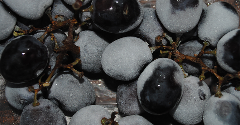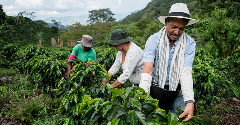sponsored content
Almonds a key ingredient in healthy snacking
18 Apr 2018More almond-containing products were launched in Europe than in any other region in the world in 2016, as the trend toward healthier snacking has given the nuts a major boost.

Almonds tap into a range of current European food trends, such as clean label, gluten free and plant-based, making them a popular choice for food companies looking to provide natural, healthy, and energising products. California produces 83% of the world’s almonds, and in 2017, 27% of those were destined for Europe. In 2016, 47% of all new products with almonds were launched in Europe and, for the second year running, almonds were used in more new European products than any other nut.
Over the last 15 years, almonds have become increasingly popular as a snack and as an ingredient in chocolate, bakery, bars, nut butters and beverages. “Through our marketing campaigns in Europe, almonds have moved from being perceived as just a baking ingredient to a healthy, nutritious and sustainable snack,” said Dariela Roffe-Rackind, Director, Europe and Global Public Relations at The Almond Board of California.Plant-based milk alternativesAlmonds have also been one of the most popular source ingredients for plant-based milk alternatives, a booming market. Plant-based milks from almonds outstripped those made from soy in 2017, accounting for 22% of new global product launches, according to Mintel.“Nowhere is the versatility of almonds more prevalent than in the move towards dairy alternatives,” said Roffe-Rackind. “…Between 2013 and 2017, the use of almonds as the base of a new drink product in Europe nearly doubled – and is likely to continue to rise.”Companies that use Californian almonds can also tap into a wide range of resources, including market and consumer insights and help with formulation challenges, she said. “They should know that we are a research-based organization. We produce credible, high-level research into almond nutrition, quality and food safety, responsible farming practices and agricultural innovation, consumer research – all this research is available to our industry, partners, and manufacturers.”Sustainable practices ensure long term supply Sustainability is another key area for the Almond Board, which has had to contend with a major drought in California, one of the most severe on record. Although almonds require a good deal of water, they are not the thirstiest crop in the region. The crop per tree has been shrinking year-on-year, but the Almond Board has invested in research to improve water use and has implemented water-saving strategies that have cut the amount of water needed to produce a kilogram of almonds by 33% over the past decade.Roffe-Rackind says this benefits not only the almond industry, but improves California’s sustainability as a whole.“The fact that the majority of almond farms in California are fewer than 100 acres, and nearly 90% are family farms, many operated by third and fourth generation family growers, means that almond farmers recognise – and take very seriously – the need to carefully manage resources for current and future generations.”Related news

UK to ban junk food TV advertisements before 9pm
3 Oct 2024
In a bid to reduce childhood obesity, the UK government has introduced a policy, coming into effect on 1 October 2025, banning junk food advertising on television before the 9pm watershed.
Read more
Which food and beverage brands made TIME’s Most Influential Companies list?
2 Oct 2024
Chickpea pasta, prebiotic sodas, food boxes, non-alcoholic beer, and a soil carbon marketplace are the specialties of the five food and beverage brands that earned a spot on TIME’s 2024 list.
Read more
New environmental food scoring standards emerge
30 Sep 2024
EIT Food and Foundation Earth collaborate to launch environmental food scoring for products entering the global supply chain.
Read more
Danone removes NutriScore from products
20 Sep 2024
Following an algorithm update that gives some of its sweetened drinks a worse score, Danone has removed the front-of-pack label, NutriScore, from all of its products – putting profit before public health, say campaigners.
Read more
Nestlé develops a new fat reduction method for dairy ingredients
26 Aug 2024
A Brazil-based Nestlé research and development team has developed a way to reduce the fat in milk powder by as much as 60%, without impacting the key characteristics that consumers enjoy.
Read more
Better Juice expands its range to sorbets
16 Aug 2024
Food tech startup Better Juice has developed a technology to reduce the sugar content in fruit sorbets. The process retains the natural vitamins, minerals, and flavours of fruit, while offering manufacturers an easy-to-implement and scalable solution t...
Read more
German study reveals high sugar, fat, and salt levels in children's foods
13 Aug 2024
The food industry is making slow progress in reducing the high levels of sugar, fat, and salt in German food and beverage products marketed to children, according to the Max Rubner Institute (MRI).
Read more
Swedish court overturns prohibition on winery’s use of imported frozen grapes
12 Aug 2024
Swedish company Drood Winery has successfully challenged the Swedish Food Agency’s decision to prohibit the production and sale of their product made from frozen grapes imported from Iran.
Read more
Paris Olympics: Food and beverage brands champion health, fun, and sustainability
5 Aug 2024
Food and beverage brands are aligning with the Paris Olympics 2024 Food Vision, which emphasises sustainability, local sourcing, and plant-based diets.
Read more
The coffee supply chain is failing farmers, says Solidaridad
30 Jul 2024
The coffee industry’s economic model means its profits do not reach farmers, despite there being enough value to be shared all along the supply chain, according to a new report by Solidaridad Network and IDH.
Read more